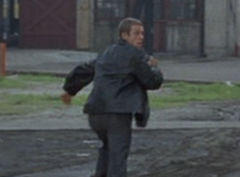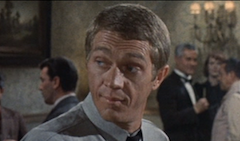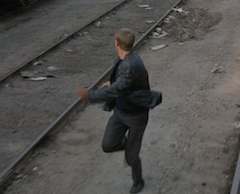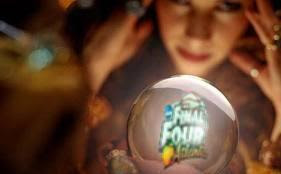Bret Harte’s “The Outcasts of Poker Flat”
The story opens in late November 1850 in the interestingly named California town of Poker Flat. John Oakhurst, a professional gambler, correctly senses a sudden alteration in the town’s “moral atmosphere” thanks to the strange behavior of others to his presence. Sure enough, in a “spasm of virtuous reaction,” a secret committee has been formed “to rid the town of all improper persons,” Oakhurst included.
Two men have already been hanged, and soon Oakhurst and three others -- a man known as “Uncle Billy” (a thief) and two women, “Mother Shipton” and the “Duchess” (presumably prostitutes) -- are forcibly exiled. The narrator exposes the hypocrisy of the committee, noting how among those in charge of executing such justice were some who lost to Oakhurst at poker. In fact, he probably would have been hanged as well if not for “the crude sentiment of equity residing in the breasts of those who had been fortunate enough to win from Mr. Oakhurst.”
Oakhurst is described as receiving his punishment with “philosophic calmness.” “He was too much of a gambler not to accept fate,” we are told, and indeed it is this recognition of that which he cannot control Oakhurst has learned at the tables that marks his character and foreshadows the story’s conclusion.
We follow the four outcasts out of town as they travel toward neighboring Sandy Bar, a trek that requires a difficult passage through the Sierras. The trip could be accomplished in a day, but after traversing half its length the group attempt to persuade Oakhurst into stopping and setting up camp for the night. Using a poker metaphor, he argues against their “throwing up their hand before the game was played out,” but ultimately gives in.
While the others get drunk, a young man named Tom Simson happens on the group, accompanied by his girl, Piney. The pair are traveling in the opposite direction, leaving Sandy Bar for Poker Flat in the hopes of getting married starting a new life there.
Oakhurst knows Simson from having played poker with him before at Sandy Bar. In fact, Oakhurst cleaned out the youngster -- referred to in the story as the “Innocent” -- then afterwards gave him back the money he’d won, instructing him never to gamble again. For this gesture Simson remains grateful, and Oakhurst again helps Simson by arranging to allow him and Piney to camp with the others.
The skies -- and story -- take a dark turn, however, as they awake the next day to discover a snowstorm. And making matters worse, Uncle Billy has stolen off with the mules, leaving the remaining five no method of escape.
Only possessed with ten days’ worth of provisions, Oakhurst recognizes the situation as potentially dire, but keeps his concern to himself so as not to worry the others. They pass the time singing and listening to Simson retell stories from Homer’s Iliad, translating them into “the current vernacular of Sandy Bar.”
Meanwhile, Oakhurst is careful not to produce the pack of cards he carries with him, the implication being he doesn’t want to introduce poker into this scene of “square fun.”
Yet poker has prepared him well for the present trial. Long sessions have meant he’s “often been a week without sleep,” thus enabling him better to handle the test of physical endurance the trip has presented. Poker has also helped equip Oakhurst with a kind of mental fortitude to withstand the sudden misfortune that has befallen the travelers.
“Luck... is a mighty queer thing,” he tells Simson. “All you know about it for certain is that it’s bound to change. And it’s finding out when it’s going to change that makes you.”
He additionally notes the “streak of bad luck since we left Poker Flat” and how Simson has now been made to share in it. However, after a lifetime of riding out such downswings in fortune, Oakhurst soon comes to realize this to be one instance in which his luck will not changing.
They reach the end of their provisions, and Mother Shipton -- who, it is discovered, has been starving herself to save food for the others -- perishes. Oakhurst then takes Simson aside, provides him with a pair of snow shoes, then points him in the direction of the town where he and the others cannot go, Poker Flat. When the “Innocent” asks Oakhurst what he intends to do, the answer is brief and to the point.
“I’ll stay here.”
Alas, although we never learn of young Simson’s fate, his attempt to rescue the others fails as the final scene shows “the law of Poker Flat” discovering the Duchess and Piney having died. “You could scarcely have told, from the equal peace that dwelt upon them, which was she that had sinned,” the narrator observes.
The group also find Oakhurst “with a derringer by his side and a bullet in his heart,” having shortened his own life by an extra day or two in the hopes of extending those of the others. Before killing himself, Oakhurst pinned a playing card to a pine tree with his bowie knife, his choice of the deuce of clubs perhaps symbolizing the decreased value he’d estimated his remaining moments to possess.
On the card, the lawmen see that Oakhurst has written his own epitaph: “BENEATH THIS TREE LIES THE BODY OF JOHN OAKHURST, WHO STRUCK A STREAK OF BAD LUCK ON THE 23D OF NOVEMBER, 1850 AND HANDED IN HIS CHECKS ON THE 7TH DECEMBER, 1850.” (To the left is a still from the end of the 1937 film adaptation, one of several that have been made from Harte’s story.)
The story ends somewhat enigmatically with the narrator referring to Oakhurst as “at once the strongest and yet the weakest of the outcasts of Poker Flat,” although such a paradoxical character assessment can be explained.
What distinguishes Oakhurst -- or makes him the “strongest” -- is his correct understanding of the way poker requires one to accept the influence of luck, both good and bad. In other words, it is not an immoral game for “improper persons,” but an activity for mature adults able to accept and withstand the game’s inevitable ups and downs.
Such is life, of course, with the death-causing snowstorm revealing the cruel indifference of Nature (or “fate”) that Oakhurst also accepts with “philosophic calmness.”
That said, poker isn’t for everyone. Young Simson -- the “Innocent” -- isn’t prepared for its challenge, something Oakhurst recognized after playing with him back at Sandy Bar. Nor are those committee members whose response to losing at cards is to punish the victors with execution or exile, and to group poker with other activities thought to violate their self-righteous (and hypocritical) sense of virtue.
Meanwhile, Oakhurst is the “weakest” of the outcasts for the same reason, his understanding of the situation having encouraged his noble self-sacrifice. And it is worth noting that poker has prepared him to accept losing -- to know when it is time to “hand in his checks.”
“The Outcasts of Poker Flat” neither champions nor condemns poker, but rather evokes the game to suggest certain ideas about human nature and our relative willingness and/or ability to withstand misfortune. Harte’s story also provides an interesting commentary on poker’s ambiguous status in American culture both then and now, showing how the game has much to teach us -- if we can be mature enough to accept its lessons, that is.
Labels: *the rumble, Bret Harte, literature, morality, The Outcasts of Poker Flat














 with which he open-pushed all in. His opponent, Kai Chang, called from the big blind with
with which he open-pushed all in. His opponent, Kai Chang, called from the big blind with 
 , and Chang won the hand. If the button had been placed correctly, Volpe would’ve been dealt Chang’s hand, the third player (Joe Nguyen) would’ve been dealt Volpe’s hand, and thus the outcome might have been different.
, and Chang won the hand. If the button had been placed correctly, Volpe would’ve been dealt Chang’s hand, the third player (Joe Nguyen) would’ve been dealt Volpe’s hand, and thus the outcome might have been different.































